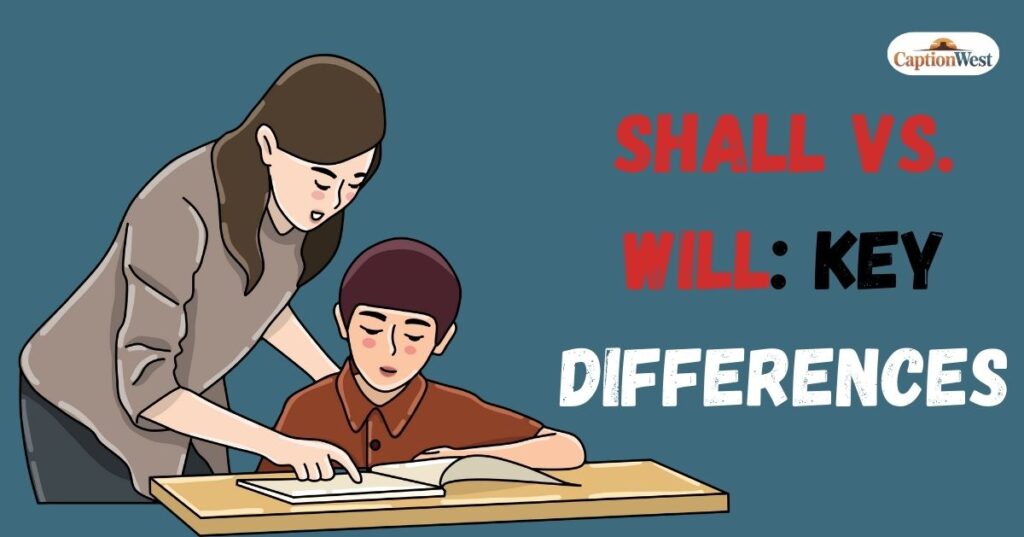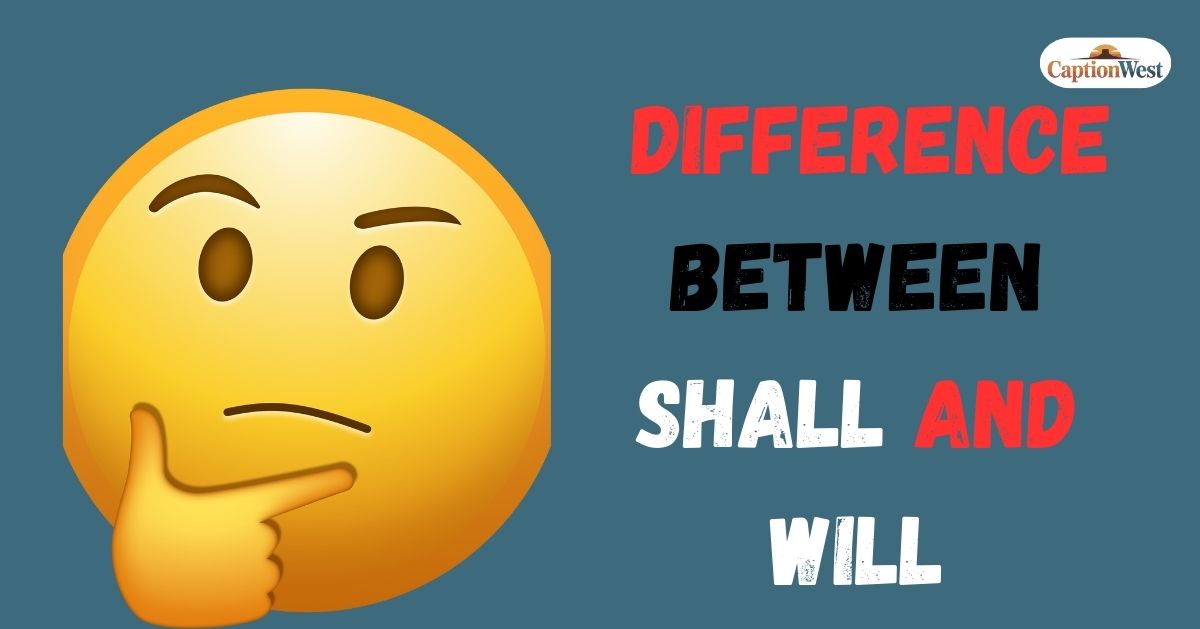When learning English grammar, one of the most common questions is about the difference between shall and will. Both are auxiliary (helping) verbs used to talk about the future, but their usage can be confusing.
Traditionally, grammar rules distinguished them very clearly, but in modern English, the lines have blurred, especially in spoken language. This article will help you understand their meanings, forms, and contexts so you can use them confidently.
What Are Shall and Will?
Both shall and will are modal verbs that combine with the base form of a verb to express the future tense. For example:
- I will call you tomorrow.
- We shall meet again soon.
Traditional Rule
- Shall: used with I and we (first-person subjects).
- Will: used with you, he, she, it, they (second and third-person subjects).
Example:
- I shall go to the market.
- He will join us later.
Modern Usage
In today’s English, especially American English, will is far more common than shall. Most speakers use will in almost every situation, while shall is reserved for formal writing, legal documents, or polite offers and suggestions in British English.
Forms of Shall and Will

Affirmative Sentences
- I will/shall finish my homework soon.
- They will arrive at 6 p.m.
Negative Sentences
- I will not (won’t) attend the party.
- We shall not (shan’t) forget this day.
Interrogative Sentences
- Will you help me with my bags?
- Shall we go for a walk?
Using “Will”
Among the two, will is the more common choice. It works with all subjects and is natural in both spoken and written English.
1. Describing the Future
- The train will leave at 7 o’clock.
- She will be at the office tomorrow.
2. Making Predictions
- The weather will be sunny this weekend.
- I think they will win the tournament.
3. Expressing Decisions Made on the Spot
- (Phone rings) I’ll answer it.
- I’ll have the chicken sandwich, please.
4. Making Requests
- Will you please turn down the music?
- Will you help me carry this box?
5. Promises and Offers
- I’ll call you as soon as I arrive.
- Don’t worry, we’ll help you finish the work.
6. Conditional Sentences
- If it rains, I’ll bring an umbrella.
- If they study hard, they will pass the exam.
Key Point: Will is flexible and widely understood. For most learners, it is the safe choice.
Using “Shall”
Although less common today, shall still appears in formal contexts and certain types of questions. Its tone is often more polite or official.
1. Offers (with I/we)
- Shall I open the window?
- Shall we help you with your luggage?
2. Suggestions (with I/we)
- Shall we go out for dinner tonight?
- Shall I invite Anna to the meeting?
3. Formal Obligations
Often seen in contracts, laws, or rules.
- Tenants shall pay rent on the first day of the month.
- The company shall provide a full refund if the product is defective.
4. Formal Promises or Determinations
- I shall never forget your kindness.
- We shall overcome these difficulties.
5. Very Formal Future Statements
- The ceremony shall begin at 10 a.m.
- All guests shall remain seated during the performance.
Shall vs. Will: Key Differences

Here is a breakdown of the difference between shall and will:
| Context | Shall | Will |
| Traditional Grammar | Used with I/we | Used with you, he, she, it, they |
| Modern Usage | Formal, polite, British English | Common in everyday English |
| Requests | Rare | Frequently used |
| Offers/Suggestions | Common (Shall we?/Shall I?) | Less common |
| Legal/Official Language | Frequently used | Sometimes used, but less formal |
| Spoken English | Rare except for offers/suggestions | Very common |
Examples of Shall and Will in Sentences
Examples with Will
- The concert will start at 8 p.m.
- I will call you later tonight.
- She will travel to London next week.
- Will you join us for dinner?
- If they work hard, they will succeed.
Examples with Shall
- Shall we take a break now?
- Shall I help you with your project?
- The accused shall appear in court tomorrow.
- We shall never surrender.
- All passengers shall remain seated until the plane stops.
Common Mistakes to Avoid
- Overusing Shall in Everyday Speech
- ❌ I shall go shopping later. (sounds too formal in casual conversation)
- ✅ I will go shopping later.
- ❌ I shall go shopping later. (sounds too formal in casual conversation)
- Using Shall with All Subjects
Traditionally, shall goes with I/we. Using it with he, she, they can sound old-fashioned unless the context is legal or poetic. - Confusing Suggestions with Predictions
- Shall we meet tomorrow? → (making a suggestion)
- Will we meet tomorrow? → (asking about a prediction or plan)
- Shall we meet tomorrow? → (making a suggestion)
Legal and Formal Usage of Shall
In contracts, regulations, and official documents, shall has been the traditional choice to indicate obligation. For example:
- Employees shall wear ID badges at all times.
- The landlord shall repair structural damages promptly.
However, modern legal writing often replaces shall with must for clarity:
- Employees must wear ID badges at all times.
Still, you will frequently encounter shall in formal documents, so it’s important to recognize its function.
Shall and Will in Questions
Both shall and will can form questions, but their meanings may differ:
- What will happen if I press this button? → asking about a prediction.
- What shall we do after the meeting? → asking for a suggestion.
- Will you attend the seminar? → requesting confirmation.
- Shall I book the tickets now? → offering to take action.
Shall vs. Will in British and American English
- British English: More likely to use shall for offers and suggestions, especially in formal contexts.
- American English: Rarely uses shall outside of legal or very formal writing. Will dominates everyday speech and writing.
Example:
- British: Shall we go to the cinema?
- American: Should we go to the movies? or Will we go to the movies?
Related Verbs: Should and Would
Both shall and will have past tense or related forms:
- Shall → Should (used for advice or hypothetical situations).
- Will → Would (used for polite requests, hypothetical, or future-in-the-past).
Examples:
- You should eat more vegetables. (advice)
- If I had more time, I would travel the world. (hypothetical)
Read Must : Difference Between At and To: A Complete Grammar Guide
Practical Tips for Learners

- Default to Will: In most cases, especially casual conversations, will is the best option.
- Use Shall for Suggestions: “Shall we…?” and “Shall I…?” are polite and correct in British English.
- Recognize Formal Usage: Expect shall in contracts, laws, or official announcements.
- Don’t Overthink: Native speakers often use will in all situations. Understanding the difference is more important for reading comprehension than for everyday speaking.
Understanding the Difference Between Shall and Will
The difference between shall and will often confuses learners because both are used for future tense. While will is more common in everyday English, shall is generally reserved for formal contexts, legal documents, or when expressing determination. Understanding this subtle difference between shall and will helps writers choose the right word depending on tone, audience, and formality.
Traditional vs. Modern Usage: The Difference Between Shall and Will
When it comes to grammar rules, the difference between shall and will is tied to tradition versus modern usage. Traditionally, shall was used with “I” and “we,” while will applied to other subjects. However, in contemporary English, will dominates across all subjects, and shall is mostly used in formal writing or official statements. This evolution shows how the difference between shall and will reflects changes in language over time.
Conclusion
The difference between shall and will lies in tradition, formality, and context. While will is the dominant choice in modern English, shall still holds a place in formal writing, polite offers, suggestions, and legal documents. If you are an English learner, remember this simple rule:
- Use will for most situations.
- Use shall for formal contexts, offers, and suggestions.
Mastering this distinction not only improves your grammar but also helps you sound more natural and professional in different contexts.

